Description
MASTER THE UNSEEN
At the peak of aerial cinematography, DJI Inspire 3 offers unprecedented workflow efficiency, camera language, and creative freedom. This all-in-one 8K camera drone empowers professional-level filmmakers to fully maximise the potential of any shot and master the unseen.
THE DEFINITION OF POWER AND PERFORMANCE
SLEEK, INTEGRATED DESIGN
Inspire 3 is a professional camera drone that adopts a fluid new design that takes aerodynamics fully into consideration to reduce air resistance.
The max dive speed has increased from the 9 m/s of Inspire 2 to 10 m/s, while vertical ascend/descend speed has increased from 6 m/s and 4 m/s to 8 m/s. [1]
Powerful manoeuvrability delivers responsive, accurate control and an extended flight time of up to 28 minutes. [2]
The FPV camera, visual sensors, positioning antennas, and storage card slot all adopt designs that are seamlessly integrated into the airframe for a minimalist look and modern industrial aesthetics.
Inheriting the classic transformable configuration of the Inspire series, Inspire 3 uses an all-new design that supports 360° Pan and Tilt Boost structures. When the landing gear is lowered, the gimbal supports obstruction-free 80° upward-angle shooting, [3] enabling cinematographers to capture strikingly innovative shots.
From the outer design to the internal structure, every detail of Inspire 3 was carefully considered and optimised.
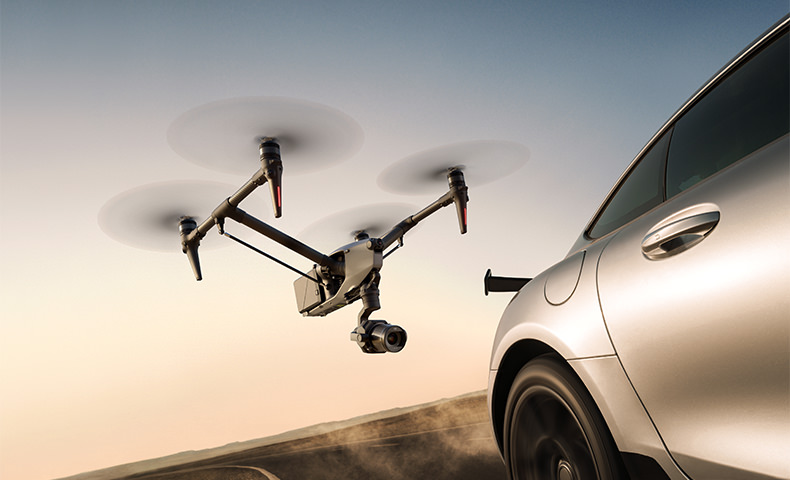
HIGH-MOBILITY PRECISION FLIGHT SYSTEM
CENTIMETER-LEVEL RTK POSITIONING
Inspire 3 integrates high-precision RTK positioning technology used in industries such as architecture and surveying to deliver centimetre-level accuracy. [4] Compared with traditional metre-level positioning supported by Global Navigation Satellite Systems (GNSS), RTK not only makes flying more stable, but also makes flight-route planning more accurate, significantly improving creative efficiency.
RTK antennas have been built into the airframe with a new stacked ceramic design, which enables three types of GNSS (GPS, BeiDou, and Galileo) and delivers dual-frequency positioning down to the centimetre level. By activating an RTK network [5] or setting up a D-RTK 2 Mobile Station, [6] users can achieve highly accurate positioning without mounting any additional modules.
Use custom network RTK directly in RTK-covered areas. Simply enable internet access on DJI RC Plus and connect to an NTRIP server to allow Inspire 3 to receive comprehensive data for fast and accurate positioning.
In environments without network RTK coverage, the RTK function can be used by setting up a D-RTK 2 Mobile Station. Then, Inspire 3 can receive comprehensive data from the mobile station for accurate positioning.
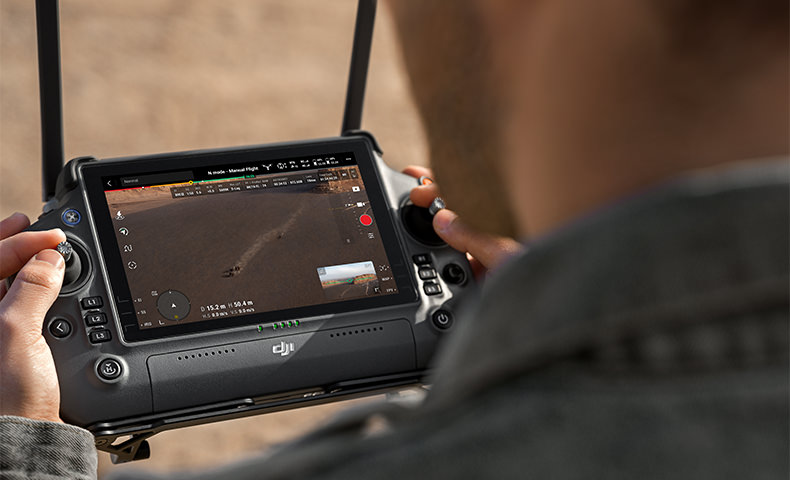
DUAL-ANTENNA ORIENTATION
Both the front and the rear of Inspire 3 have a built-in stacked ceramic antenna, providing powerful anti-magnetic-interference capability to further improve flight accuracy and safety.
WAYPOINT PRO
Specially designed for aerial cinematography, Waypoint Pro enables flight-route and shot planning with a wide range of customised settings. With the new Repeatable Routes and 3D Dolly modes, an innovative automated shooting experience can be easily achieved. In addition, RTK centimetre-level positioning ensures more accurate flight-route planning and execution. Whether solo shooting or in a professional crew, use Waypoint Pro to master even highly-complex scenes.
.jpg)
REPEATABLE ROUTES
Using Repeatable Routes, the aircraft will automatically fly on the same route and maintain all preset parameters such as altitude, speed, gimbal angle, and camera settings. Repeating the same flight mission allows cinematographers to effortlessly perform difficult one-takes, or to fly at different times in the same place to easily create long-duration timelapses that capture transitions such as day to night or season to season.
3D DOLLY
3D Dolly can simulate a crane, cablecam, or dolly on film sets while going far beyond the limitations of those devices.
After planning a flight route, the cinematographer can manually control the aircraft to move along the route back and forth while adjusting parameters such as speed, gimbal angle, and more according to the needs of the shot. This makes complicated cinema-grade camera movements easier and more efficient and can deliver improved visual effects.
SPOTLIGHT PRO
Upgraded from Inspire 2, Spotlight Pro further enables solo creators with more shot possibilities. Based on powerful machine-learning algorithms, Inspire 3 supports automated subject recognition and locking for people, vehicles, and boats with greater accuracy than its predecessor.
When using Spotlight Pro's Follow mode, the aircraft and gimbal camera orient toward the same direction and remain locked on the subject so that the pilot can get circling shots without manual framing adjustments.
In Free mode, thanks to the 360° gimbal pan of Inspire 3, the gimbal camera can stay locked on a subject, while a solo pilot uses the FPV camera to check their surroundings and control the flight route more responsively to achieve complex camera movements more easily.
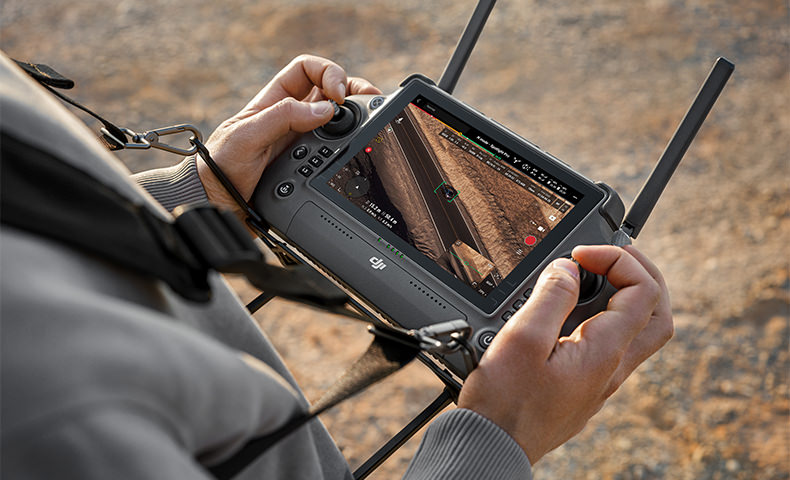
OMNIDIRECTIONAL SENSING SYSTEM
Inspire 3 is equipped with nine sensors, which enable a robust omnidirectional sensing system that can detect obstacles in all directions and provide comprehensive protection for flying. [7]
For the first time, a fisheye camera has been added to each of the four landing arms. This design helps to avoid obstruction from the airframe when the landing gear is raised and allows for horizontal obstacle sensing when the landing gear is lowered.
- 360° Horizontal Visual Sensors
- Upward Visual Sensors
- Downward Visual Sensors
- Downward ToF Sensor
CUSTOMIZABLE OBSTACLE SENSING
In addition, Inspire 3 features a new customizable function to help ensure greater flight safety and more creative freedom. Horizontal, upward, and downward obstacle sensing can be enabled or disabled independently, and an obstacle alert range can be manually set to suit different scenarios. [8]
When active avoidance is turned off, users can still view the distance from an obstacle on the navigation display in real-time and receive an audio alert when an obstacle is within a set range without the aircraft performing an automatic avoidance movement. This brings new possibilities to professional aerial teams that want to achieve more complex camera language.
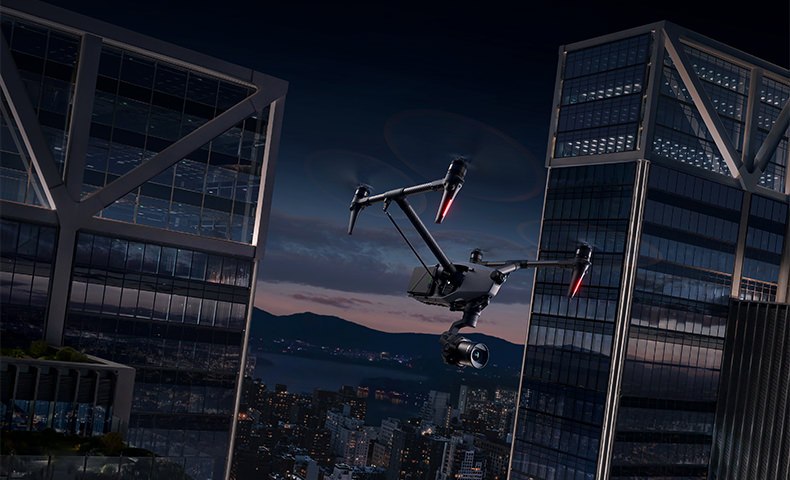
ULTRA-WIDE NIGHT-VISION FPV CAMERA
Inspire 3 is equipped with a new 1/1.8-inch-sensor FPV camera with a 3μm pixel size, an ultra-wide DFOV of 161°, and the ability to transmit live feeds at up to 1080p/60fps. Compared to its predecessor, the DFOV is approximately doubled. This FPV camera delivers more impressive light-sensing capability, allowing pilots to observe their surroundings vividly and clearly, even at night, and ensure greater levels of flight safety.
Inspire 3
| Sensor Size |
1/1.8-inch |
| DFOV |
161° |
| Live Feed Quality |
1080p/60fps |
Inspire 2
| Sensor Size |
1/7.5-inch |
| DFOV |
84° |
| Live Feed Quality |
480p/30fps |
A STUNNING NEW AERIAL PERSPECTIVE
FULL-FRAME 8K IMAGING SYSTEM
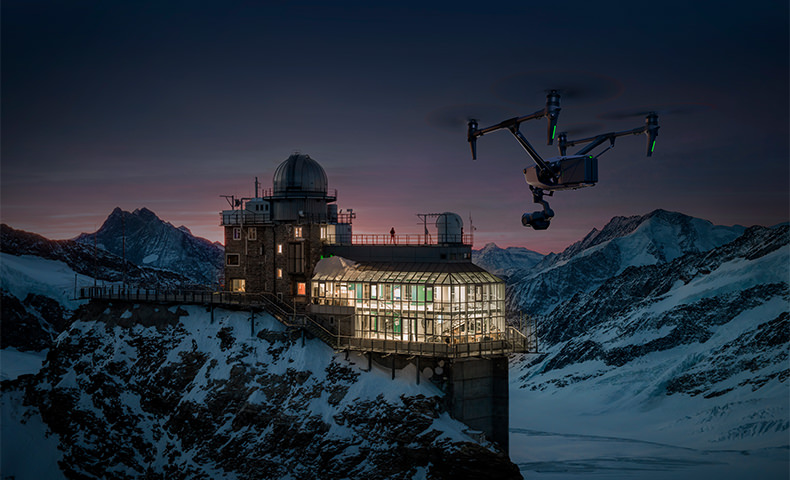
TAILORMADE 8K SENSOR
DJI’s lightest-ever full-frame three-axis gimbal camera, the X9-8K Air, is custom-built for Inspire 3 to take drone cinematography to the next level. It features DJI’s latest image processing system, CineCore 3.0, supporting internal recording of up to 8K/25fps CinemaDNG video [9] as well as 8K/75fps [10] Apple ProRes RAW video, [9] meeting the needs of top-class film and television productions.
Internal Recording of ProRes RAW up to 8K/75fps
Internal Recording of CinemaDNG up to 8K/25fps
8K means ultra-high-resolution aerial footage that retains true-to-life texture close to what the human eye sees, with clarity that stuns audiences when displayed on larger screens. RAW brings X9-8K Air's sensor fully into play, providing abundant space for visual effects and colour grading.
In S&Q mode, X9-8K Air supports internal recording of up to full-frame 4K/120fps ProRes RAW video without cropping, providing more creative editing options.
DUAL NATIVE ISO
X9-8K Air supports dual native ISO. At full-frame 30fps and below, it offers EI 800/4000, supporting the 24fps commonly seen in film productions and the 25fps used in commercial and television productions. At above 30fps, EI 320/1600 is available.
This allows X9-8K Air to record images with exquisite details and minimal noise, even low-light cityscapes or beaches, putting it on par with professional ground-based cinema cameras.
14+ STOPS OF DYNAMIC RANGE
X9-8K Air covers 14+ stops of dynamic range, which captures rich highlight and shadow details in complex lighting scenarios like sunrises and sunsets. High dynamic range brings more possibilities for post-editing, retaining genuine colours even after significant exposure adjustments.
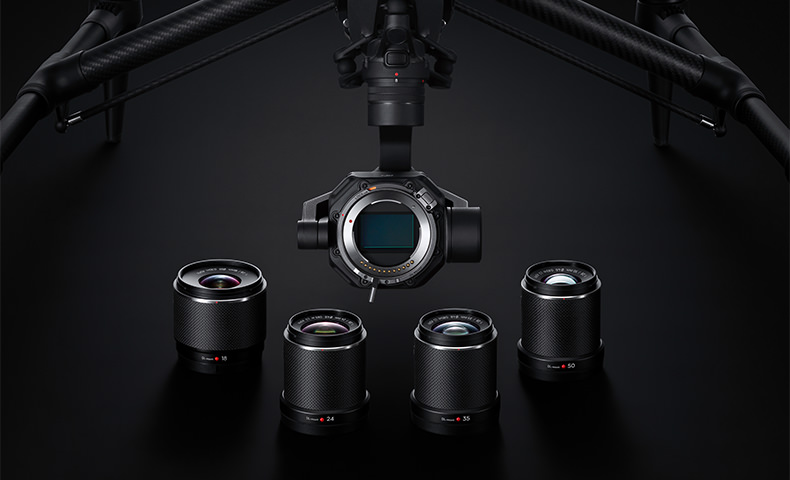
DL MOUNT LENSES [11]
Inheriting DJI’s proprietary DL mount, X9-8K Air is compatible with an additional 18 mm F2.8 full-frame ultra-wide lens and a new telephoto lens (will be released at a later date) [12] on top of the previous full-frame lens selections of DL 24/35/50 mm F2.8. All five lenses are custom-made for aerial cinematography. The housings are made of lightweight, monocoque carbon fibre, so the lightest lens weighs just 178 g, meeting Inspire 3's requirement for ultra-high manoeuvrability.
The new DL 18 mm F2.8 ASPH full-frame lens is specially made for 8K aerial cinematography. With a full-frame DFOV of 100°, the 18 mm focal length can include more information, making it highly useful for capturing the grandeur of larger subjects like mountains and architecture. Additionally, when closely approaching a subject, the ultra-wide angle can introduce an added visual tension. Its high sharpness and well-controlled chromatic aberration also allow the lens to record 8K imagery with richer details and true-to-life colours.
DJI CINEMA COLOUR SYSTEM (DCCS)
Building on DJI's mature colour science and technology, the DJI Cinema Colour System allows the X9-8K Air to retain authentic colours that redefine the look of aerial cinematography. This applies to natural settings and urban landscapes, and also accurately captures skin tones in different environments and lighting conditions. DCCS ensures effortless colour matching between X9-8K Air and ground-based cinema cameras such as DJI Ronin 4D, delivering consistent colour style from air to ground to meet the needs of film-production post-editing workflows.
MULTI-CAMERA TIMECODE SYNC
Through the 3.5mm port on the aircraft, you can sync timecode between equipment in the air and on the ground. When dealing with abundant footage from multiple cameras, timecode sync makes the editing process significantly more simplified and efficient.
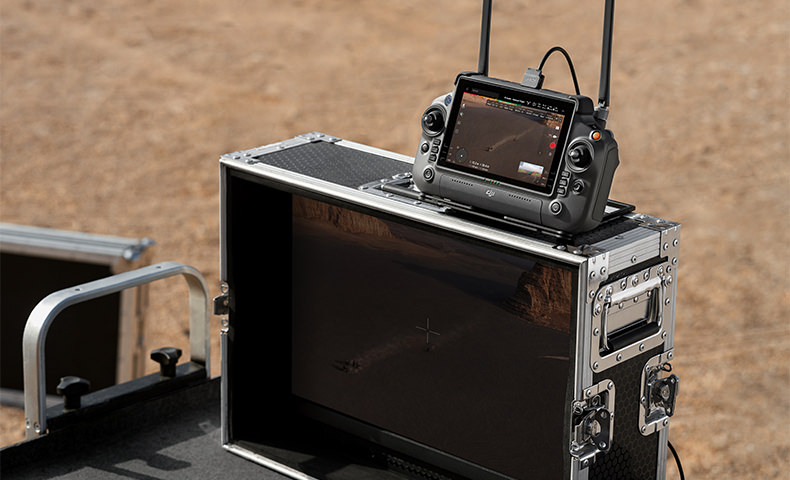
O3 PRO VIDEO TRANSMISSION AND CONTROL SYSTEM
DJI RC PLUS
Inspire 3 comes with a professional-level remote controller, the DJI RC Plus, which has a built-in 7-inch 1,200-nit high-bright screen to provide an extraordinary outdoor monitoring experience. It also features an HDMI out port, along with several buttons and dials on the front, back, and top, which enable fast and intuitive operation. Button functions can also be customised to fit users' habits and deliver a more smooth operating experience.
The built-in battery of RC Plus provides an operating time of approximately 3.3 hours, and extends to 6 hours with an external WB37 battery. [11] It also supports battery hot-swapping to improve creative efficiency.
On top of the classic flight control interface, the new DJI Pilot 2 app for Inspire adds a cinema-grade monitoring interface, which allows simple and convenient checking of information like camera exposure, video specifications, focal length, and gimbal angle, easily meeting the monitoring requirements of gimbal operators and DPs.
Professional accessories such as a strap and waist support are also included for more comfortable and efficient long-duration use.
CINEMA-GRADE O3 PRO VIDEO TRANSMISSION [13]
Inspire 3 is equipped with O3 Pro, DJI’s latest cinema-grade video transmission system, which enables a max transmission distance of 15 km in single control mode [14] and 12 km [15] in dual-control mode. Both the gimbal camera and FPV camera support 1080p/60fps live feeds and an ultra-low latency of 90 ms. [16] Compared to the Lightbridge video transmission system of Inspire 2, O3 Pro has taken a generational leap in transmission distance, latency, and overall stability.
For the first time, 4K/30fps live feeds are also supported with a max 5km transmission distance to meet the needs of UHD monitoring and livestreaming on set. [17]
Inspire 3
|
Max Video Transmission Range (Single Control)
|
15 km
|
|
Max Video Transmission Range (Dual Control)
|
12 km |
| Max Live Feed Frame Rate |
1080p/60fps |
| Max Live Feed Resolution |
4K/30fps |
Inspire 2
|
Max Video Transmission Range (Single Control)
|
7 km
|
|
Max Video Transmission Range (Dual Control)
|
7 km |
| Max Live Feed Frame Rate |
720p/30fps |
| Max Live Feed Resolution |
720p/30fps |
INDEPENDENT LINKS FOR DUAL CONTROL [18]
Compared with its predecessor, the dual-control experience of Inspire 3 has been significantly upgraded. Two remote controllers can receive live feeds and control the drone independently, so the pilot and gimbal operator can be at different positions on set. This breaks Inspire 2's limitations of binding the primary and secondary control links.
If the pilot loses aircraft signal, the gimbal operator is now able to take control of the aircraft to safely return to home or land directly.
COMPATIBLE WITH THE DJI PRO ECOSYSTEM
SUPPORTS DJI HIGH-BRIGHT REMOTE MONITOR [11]
In addition to RC Plus, Inspire 3 also allows use of the DJI High-Bright Remote Monitor as a second remote controller. The remote monitor can pair directly with Inspire 3 to receive live feeds, and can even control gimbal and focus when the Ronin 4D Hand Grips are attached. [11] HDMI [19] and SDI [19] ports on the remote monitor can also output live feeds to other monitoring devices.
.jpg)
SUPPORTS DJI THREE-CHANNEL FOLLOW FOCUS [11]
As a member of the DJI PRO ecosystem, the new DJI Three-Channel Follow Focus can transmit control signals to Inspire 3 via the O3 Pro transmission system (this requires a DJI High-Bright Remote Monitor to act as an intermediary device). With Three-Channel Follow Focus, the focus puller can achieve accurate remote focus control and stepless aperture adjustments to deliver an integrated wireless monitoring and control experience.
* When DJI Three-Channel Follow Focus is used with two DJI RC Plus remote controllers, the intermediary DJI High-Bright Remote Monitor must connect to the gimbal operator's RC Plus via HDMI and USB A-C cables. This enables piloting, gimbal control, and focus control to be done independently by the designated personnel.
SUPPORTS DJI MASTER WHEELS [11]
When a DJI High-Bright Remote Monitor is paired as the second controller (as the intermediary to the PRO ecosystem), Inspire 3's gimbal can be controlled using DJI Master Wheels. In this way, it can provide a gimbal control experience on par with Ronin 2 to meet the operating habits of cinematographers.
SUPPORTS DJI TRANSMISSION [11]
With DJI Transmission, Inspire 3 supports expanded monitoring on set. Connect an RC Plus to a DJI Video Transmitter with Broadcast mode enabled. [20] Then, live feeds can be transmitted to an unlimited number of remote monitors, further improving coordination efficiency.
.jpg)
BUILT FOR ALL-DAY SHOOTING
EFFICIENT FULL-SCENARIO OPERATION
DUAL-BATTERY SYSTEM
Inspire 3 is equipped with a new TB51 dual-battery system, which utilizes the latest battery chemistry technology for optimized reliability and performance.
TB51 batteries are smaller, lighter, more streamlined, and higher voltage compared to TB50. They provide a 28-minute max flight time [2] and support hot swapping with a redesigned battery release that allows effortless continuous operation.
If the temperature of the battery goes lower than 18° C (64° F), the battery will trigger an auto-heating function, maintaining adequate flight performance even in locations with temperatures as low as -20° C (-4° F).
NEW BATTERY CHARGING HUB
The all-new foldable battery charging hub strikes the optimum balance between charging efficiency and storage size. It can accommodate eight batteries. In Fast mode, it can charge two batteries to 90% in just 35 minutes [21] and eight batteries to 100% in only 160 minutes. [21] The included 65W USB-C port can also be used to charge an RC Plus.
DJI PROSSD 1TB Included
The included DJI PROSSD 1TB supports a max read speed of 900Mbps [22] and the footage can be read on a computer directly through the provided USB-C to USB-C cable without the need for a card reader.
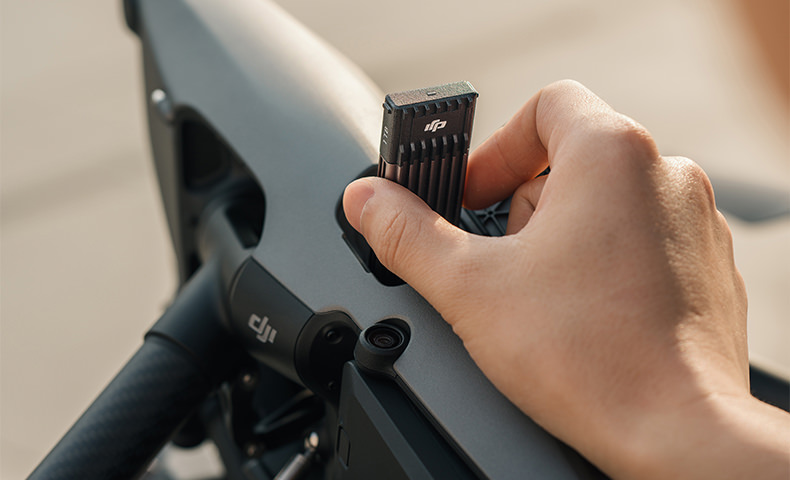
STORAGE AND TRANSITIONS
The newly designed trolley case is equipped with an extendable handle, two side handles, and four 360-degree-movement wheels, making transitions and transportation effortless. Additionally, two numbered locks are equipped for added safety. The well-designed trolley case can store one aircraft, one X9-8K Air gimbal camera, two RC Plus remote controllers, four lenses, twelve batteries, two battery charging hubs, three sets of propellers, and other items. New foldable quick-release propellers are easy to store and don’t require re-installation before each flight.
Footnotes
* Please check and strictly abide by local laws and regulations before flying.
** All data was tested with a production model DJI Inspire 3 in a controlled environment. Actual experience may vary depending on the environment, usage, and firmware version.
*** All videos and images on this page were shot in strict compliance with relevant local laws and regulations.
**** Before use, Inspire 3 must be activated via the DJI Pilot 2 app.
1. Full speed tested when flying in a windless environment at sea level, with gimbal camera and lens attached to the aircraft and without other accessories. The data is for reference only.
2. Measured when flying forward at a constant speed of 36 kph with the landing gear down in a windless environment at sea level, with gimbal camera and lens attached to the aircraft and without other accessories, and recording 4K/24fps H.264 (S35) video until the battery reached 0%. This data is for reference only. Please refer to the actual values in the app.
3. Measured using DL 50 mm lens with landing gear lowered and the aircraft hovering in a windless environment.
4. When RTK is disabled, DJI Inspire 3 uses GNSS positioning by default.
5. Before using custom network RTK, contact a local dealer to purchase the service.
6. The D-RTK 2 Mobile Station is sold separately.
7. Obstacle sensing is disabled while the landing gear is in the process of being raised or lowered. When the landing gear is down, there are obstacle-avoidance blind spots at the front-left and front-right areas of the aircraft of approximately 20°.
8. Custom brake range of obstacle avoidance: 2-10 meters horizontally, 1-3 meters upward, and 1 meter downward. Custom alert range of obstacle sensing: 2.1-30 meters horizontally, 1.1-10 meters upward, and 1.1-10 meters downward.
9. License key sold separately.
10. Shooting 8K/75fps video requires full-frame 2.4:1 aspect ratio and Apple ProRes RAW in S&Q mode.
11. Sold separately.
12. The new telephoto lens will be released at a later date.
13. Measured in an unobstructed outdoor environment free of interference, with gimbal camera and lens attached to the aircraft and without other accessories. The above data shows the farthest communication range for one-way, non-return flights under each standard. During flight, please pay attention to reminders in the app.
14. Longest video transmission distance in single control mode: FPV Camera: approx. 15 km (FCC), 8 km (CE/SRRC/MIC). Gimbal Camera (1080p/60fps live feeds): approx. 13 km (FCC), 7 km (CE/SRRC/MIC). Gimbal Camera (4K/30fps live feeds): approx. 5 km (FCC), 3 km (CE/SRRC/MIC).
15. Longest video transmission distance in dual-control mode: FPV Camera: approx. 12 km (FCC), 6.4 km (CE/SRRC/MIC). Gimbal Camera (1080p/60fps live feeds): approx. 11.2 km (FCC), 5.6 km (CE/SRRC/MIC). Gimbal Camera (4K/30fps live feeds): approx. 4 km (FCC), 2.4 km (CE/SRRC/MIC).
16. The lowest latency of the gimbal camera was measured when recording 4K/60fps ProRes RAW video. The lowest latency of the FPV camera was measured with strong video transmission signals.
17. Only when the frame rate is 30fps and below.
18. When using dual remote controllers, make sure that the antennas of both remote controllers are pointing toward the aircraft, and there is no obstruction between the remote controllers and the aircraft. Otherwise, a remote controller with poor signal may impair the communication quality of the other.
19. The port is located on the DJI Remote Monitor Expansion Plate, which is sold separately.
20. Transmission performance differs in Broadcast mode.
21. Tested at a room temperature of 25° C (77° F) in a well-ventilated environment and is for reference only.
22. Measured using the included USB-C to USB-C data cable on Apple MacBook Pro 2021 (Apple M1 Max chip).
PRODUCT SPECIFICATIONS
AIRCRAFT
Model: T740
Aircraft Weight: Approx. 3,995 g (includes gimbal camera, two batteries, lens, PROSSD, and propellers)
Max Takeoff Weight: Approx. 4,310 g
Hovering Accuracy Range: Vertical:
±0.1 m (with vision positioning)
±0.5 m (with GNSS positioning)
±0.1 m (with RTK positioning)
Horizontal:
±0.3 m (with vision positioning)
±0.5 m (with GNSS positioning)
±0.1 m (with RTK positioning)
RTK Positioning Accuracy (RTK fix): 1 cm + 1 PPM (horizontal)
1.5 cm + 1 PPM (vertical)
Max Angular Velocity: Pitch: 200°/s
Roll: 200°/s
Yaw: 150°/s
Max Tilt Angle: N Mode: 35°
S Mode: 40°
A Mode: 35°
T Mode: 20°
Emergency Brake: 55°
Max Ascent Speed: 8 m/s
Measured when flying in a windless environment at sea level, with gimbal camera and lens attached to the aircraft and without other accessories. This data is for reference only.
Max Descent Speed: Vertical: 8 m/s
Tilt: 10 m/s
Measured when flying in a windless environment at sea level, with gimbal camera and lens attached to the aircraft and without other accessories. This data is for reference only.
Max Horizontal Speed: 94 kph
Measured when flying in a windless environment at sea level, with gimbal camera and lens attached to the aircraft and without other accessories. This data is for reference only.
Max Service Ceiling Above Sea Level: Standard Propellers: 3800 m
High-Altitude Propellers: 7000 m
Measured in an environment with light wind with the gimbal camera and lens attached to the aircraft and without other accessories. This data is for reference only.
Max Wind Resistance: Takeoff/land: 12 m/s
In-flight: 14 m/s
Measured when flying at sea level, with gimbal camera and lens attached to the aircraft and without other accessories. This data is for reference only.
Max Hovering Time: Approx. 25 minutes
Measured when hovering in a windless environment at sea level with gimbal camera and lens attached to the aircraft and without other accessories, with landing gear raised, and recording 4K/24fps H.264 (S35) video until the battery reached 0%. This data is for reference only. Please refer to the actual values in the app.
Max Flight Time: Approx. 28 minutes (landing gear lowered)
Approx. 26 minutes (landing gear raised)
Measured when flying forward at a constant speed of 36 kph in a windless environment at sea level, with gimbal camera and lens attached to the aircraft and without other accessories, and recording 4K/24fps H.264 (S35) video until the battery reached 0%. This data is for reference only. Please refer to the actual values in the app.
Motor Model: DJI 3511s
Global Navigation Satellite System: GPS + Galileo + BeiDou
Propeller Model: Standard Propellers: DJI 1671
High-Altitude Propellers: DJI 1676
Operating Temperature: -20° to 40° C (-4° to 104° F)
Diagonal Distance: Landing Gear Raised: 695 mm
Landing Gear Lowered: 685 mm
Gimbal Camera
Travel Mode Dimensions: Height: 176 mm
Width: 709.8 mm
Length: 500.5 mm
Sensor: 35mm full-frame CMOS
Max Resolution: Photo: 8192×5456
Video: 8192×4320
Video Resolution: View detailed list
Supported Lens: DL 18 mm F2.8 ASPH Lens
DL 24 mm F2.8 LS ASPH Lens
DL 35 mm F2.8 LS ASPH Lens
DL 50 mm F2.8 LS ASPH Lens
Photo Format: JPG, DNG
Video Format: MOV, CinemaDNG
Operation Mode: Capture, Record, Playback
Exposure Mode: P, A, S, M
Shutter Type: Electronic shutter
Shutter Speed: 8-1/8000 s
White Balance: AWB
MWB (2000K-10000K)
ISO Range: Photo
ISO: 100-25600
Video
EI: 200-6400
Anti-flicker: Capture Mode: Auto, 50 Hz, 60 Hz, OFF
Angular Vibration Range: Hovering: ±0.002°
Flying: ±0.004°
Installation Method: Quick release
Mechanical Range: Tilt:
-128° to +110° (landing gear lowered)
-148° to +90° (landing gear raised)
Roll: -90° to +230°
Pan: ±330°
Controllable Range: Tilt (landing gear lowered):
Before gimbal pitch limit extension: -90° to +30°
After gimbal pitch limit extension: -115° to +100°
Tilt (landing gear raised):
Before gimbal limit extension: -90° to +30°
After gimbal limit extension: -140° to +75°
Roll: ±20°
Pan: ±300°
Max Control Speed: With DJI RC Plus:
Tilt: 120°/s
Roll: 180°/s
Pan: 270°/s
With DJI Master Wheels:
Tilt: 432°/s
Roll: 432°/s
Pan: 432°/s
Weight: Approx. 516 g (without lens)
VIDEO TRANSMISSION
Video Transmission System: O3 Pro
Live View Quality: FPV Camera: Up to 1080p/60fps
Gimbal Camera: Up to 1080p/60fps, 4K/30fps
Max Live Video Bitrate: 50 Mbps
Max Transmission Distance: Single Control Mode:
FPV Camera: approx. 15 km (FCC), 8 km (CE/SRRC/MIC)
Gimbal Camera (1080p/60fps live feeds): approx. 13 km (FCC), 7 km (CE/SRRC/MIC)
Gimbal Camera (4K/30fps live feeds): approx. 5 km (FCC), 3 km (CE/SRRC/MIC)
Dual-Control Mode:
FPV Camera: approx. 12 km (FCC), 6.4 km (CE/SRRC/MIC)
Gimbal Camera (1080p/60fps live feeds): approx. 11.2 km (FCC), 5.6 km (CE/SRRC/MIC)
Gimbal Camera (4K/30fps live feeds): approx. 4 km (FCC), 2.4 km (CE/SRRC/MIC)
Measured in an unobstructed outdoor environment free of interference, with gimbal camera and lens attached to the aircraft and without other accessories. The above data shows the farthest communication range for one-way, non-return flights under each standard. During your flight, please pay attention to reminders in the app.
Lowest Latency: FPV Camera: 90 ms
Gimbal Camera: 90 ms
The lowest latency of the gimbal camera was measured when recording 4K/60fps ProRes RAW video. The lowest latency of the FPV camera was measured with strong video transmission signals.
Operating Frequency: 2.4000-2.4835 GHz
5.150-5.250 GHz (CE: 5.170-5.250 GHz)
5.725-5.850 GHz
In some countries and regions, the 5.1 and 5.8GHz frequencies are prohibited, or the 5.1GHz frequency is only allowed for indoor use. Please refer to local laws and regulations.
Transmitter Power (EIRP): 2.4 GHz: <33 dBm (FCC), <20 dBm (CE/SRRC/MIC)
5.1 GHz: <23 dBm (CE)
5.8 GHz: <33 dBm (FCC), <30 dBm (SRRC), <14 dBm (CE)
BATTERY
Model: TB51 Intelligent Battery
Capacity: 4280 mAh
Nominal Voltage: 23.1 V
Type: Li-ion
Chemical System: LiCoO2
Energy: 98.8 Wh
Weight: Approx. 470 g
Operating Temperature: -20° to 40° C (-4° to 104° F)
Charging Temperature: -20° to 40° C (-4° to 104° F)
If the temperature of the battery is lower than 10° C (50° F), the battery will trigger an auto-heating function. Charging in a low-temperature environment below 0° C (32° F) may shorten battery life.
Max Charging Power: 411 W
Charge via Aircraft: Not supported
BATTERY CHARGING HUB
Input: 100-240 V AC, max 8 A
Output: 26.4 V, 7.8 A
Total Rated Output: 476 W, including 65W PD fast charging of USB-C port
Charging Time: Fast Mode: Approx. 35 minutes to 90%
Standard Mode: Approx. 55 minutes to 100%
Silent Mode: Approx. 80 minutes to 100%
Tested at a room temperature of 25° C (77° F) and in a well-ventilated environment. In Fast mode, each battery pair is charged to 90% in sequence, and then eight batteries are charged together to 100%.
Charging Temperature: -20° to 40° C (-4° to 104° F)
Weight: Approx. 1,680 g
MEMORY CARD
Memory Card Type: DJI PROSSD 1TB
SENSING
Forward: Measurement Range: 1.5-48 m
Effective Sensing Speed: ≤15 m/s
FOV:
Horizontal 90°, Vertical 103° (landing gear raised)
Horizontal 72°, Vertical 103° (landing gear lowered)
Backward: Measurement Range: 1.5-48 m
Effective Sensing Speed: ≤15 m/s
FOV: Horizontal 90°, Vertical 103°
Lateral: Measurement Range: 1.5-42 m
Effective Sensing Speed: ≤15 m/s
FOV: Horizontal 90°, Vertical 85°
Upward: Measurement Range: 0.2-13 m
Effective Sensing Speed: ≤6 m/s
FOV: Front and Back 100°, Left and Right 90°
Downward: Measurement Range: 0.3-18 m
Effective Sensing Speed: ≤6 m/s
FOV: Front and Back 130°, Left and Right 160°
Operating Environment: Forward, Backward, Left, Right, and Upward: surfaces with discernible patterns and adequate lighting (lux >15)
Downward:
surfaces with discernible patterns and diffuse reflectivity >20% (e.g., walls, trees, people); adequate lighting (lux >15)
Obstacle sensing is disabled while the landing gear is in the process of being raised or lowered.
ToF Infrared Sensor Measurement Range: 0-10 m
REMOTE CONTROLLER
Model: RM700B
Operating Time: Built-in Batteries: approx. 3.3 hours
Built-in Batteries Plus External Battery: approx. 6 hours
Operating Frequency: 2.4000-2.4835 GHz
5.725 GHz-5.850 GHz
In some countries and regions, 5.1GHz and 5.8GHz frequencies are prohibited, or the 5.1GHz frequency is only allowed for indoor use. Please refer to local laws and regulations.
Video Output Port: HDMI
Power Supply: Built-in batteries or external battery
Coordinated Operation: Supports dual controls and coordination between multiple operators
Power Consumption: 12.5 W
Operating Temperature: -20° to 50 °C (-4° to 122° F)
Storage Temperature: -30° to 45° C (-22° to 113° F) (within one month)
-30° to 35° C (-22° to 95° F) (one to three months)
-30° to 30° C (-22° to 86° F) (three months to one year)
Battery: Built-in Battery: 3250mAh-7.2V (a set)
External Battery: WB37 Intelligent Battery
Wi-Fi Protocol: Wi-Fi 6
Wi-Fi Operating Frequency: 2.4000-2.4835 GHz
5.150-5.250 GHz
5.725-5.850 GHz
Wi-Fi Transmitter Power (EIRP): 2.4 GHz: <26 dBm (FCC), <20 dBm (CE/SRRC/MIC)
5.1 GHz: <26 dBm (FCC), <23 dBm (CE/SRRC/MIC)
5.8 GHz: <26 dBm (FCC/SRRC), <14 dBm (CE)
Bluetooth Protocol: Bluetooth 5.1
Bluetooth Operating Frequency: 2.4000-2.4835 GHz
Bluetooth Transmitter Power (EIRP): < 10 dBm
APP
App: DJI Pilot 2
FPV CAMERA
FOV: 161°
Resolution: 1920×1080@60fps
IN THE BOX
Inspire 3 Aircraft × 1
RC Plus × 1
Double-Headed Screwdriver × 1
USB-C to USB-C High-Speed Data Cable × 1
USB-C to USB-A Data Cable × 1
TB51 Intelligent Battery × 6
TB51 Intelligent Battery Charging Hub × 1
TB51 Intelligent Battery Charging Hub AC Cable × 7
TB51 Intelligent Battery Paired Batteries Sticker × 1
Inspire 3 Foldable Quick-Release Propellers (Pair) × 3
PROSSD 1TB × 1
Inspire 3 Trolley Case × 1
RC Plus Strap × 1
RC Plus Waist Support × 1
Documents × 3
Zenmuse X9-8K Air Gimbal Camera × 1 (Excludes Lens)
Zenmuse X9-8K Air Gimbal Camera Case × 1
Lens Carrying Box (18/24/35/50mm) × 1
Inspire 3 Gimbal Rubber Dampers × 2